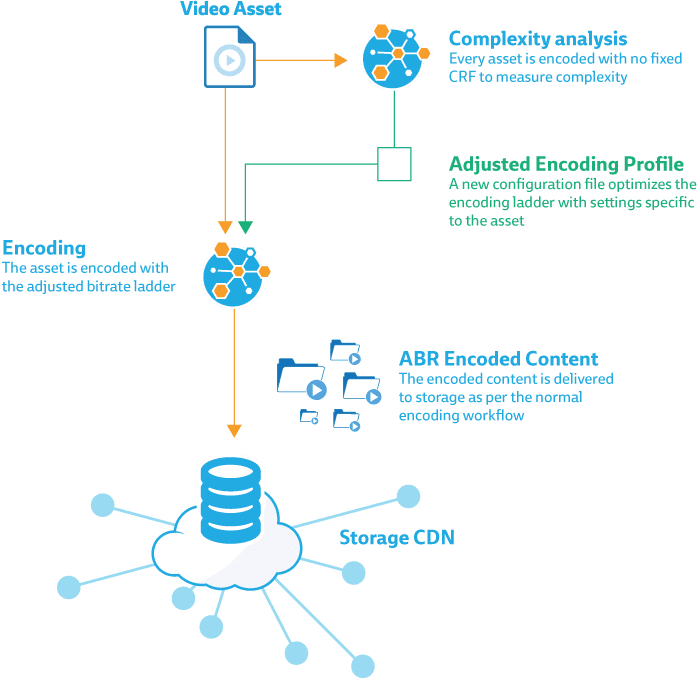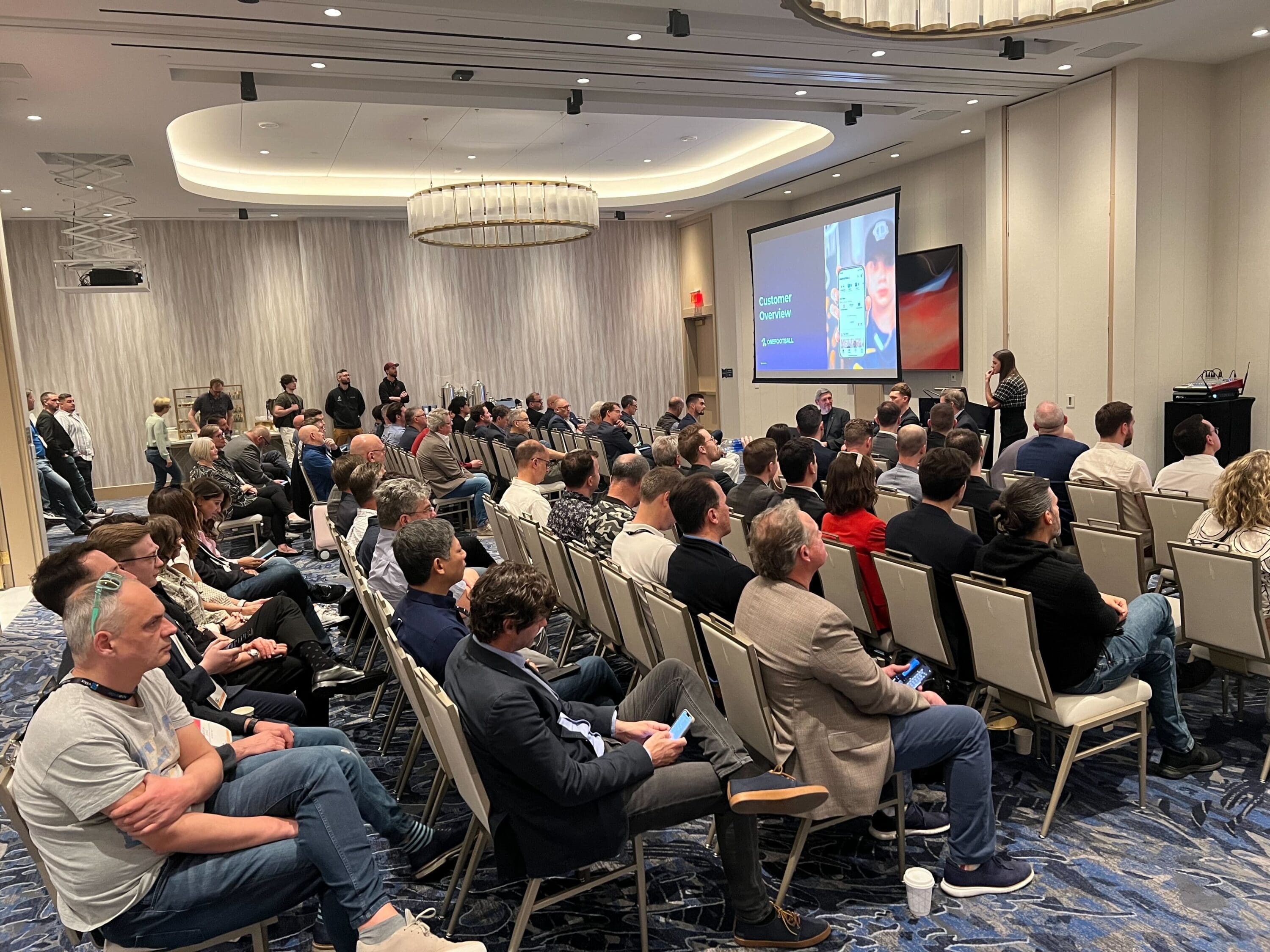As you may have heard, Bitmovin was recently honored with the Technology & Engineering Emmy® Award for the Development of Massive Processing Optimized Compression Technologies for our innovative work on our AI/ML Per-Title Encoding solution. But before the music plays me off the stage for individually thanking all of the Bitmovers who made this possible. I would like to take this opportunity to tell you a little bit about what the Technology & Engineering Award is and how Bitmovin got to here, to an award reception.
What is the Technology & Engineering Emmy® Award?

The Emmys®, a world-renowned awards ceremony was founded in 1955 by the National Academy of Television & Sciences (NATAS) as a method of recognizing the advancements of arts and sciences and the promotion of creative achievements within the television industry. However, what you may not know is that this creativity-oriented ceremony was predated by the Technology and Engineering award of 1948 that recognized the companies, organizations, and individuals for breakthroughs in television technology.
As time has progressed, so has the Technology and Engineering award – in the age of streaming, innovations are no longer oriented towards traditional broadcast media alone, but also towards those who have a significant focus on television engineering online. As such, the award categories expanded from focuses around recording, transmission, and “simple” storage technologies towards complex topics such as the development of Open Perceptual Metrics, Content Delivery, Standardizations of Media Formats, and Massive Processing Optimized Compression Technologies.
The Award for Development of Massive Processing Optimized Compression Technologies
As the number of households consuming content online (as opposed to traditional broadcast) soars to new heights, alongside the number of available services to stream new content, there’s an equally growing demand for efficient transmission of the millions of hours of content worldwide. As of summer 2020, there was an estimated count of 105,000 available hours of content in the US alone on average per household. Given the recent launches of HBO Max, Peacock, Discovery+, and more, one can assume that the number has drastically increased over the course of the last year.
Delivering that much content at scale is no easy achievement, especially when it comes to maintaining a high perceptual quality, in a timely fashion, and across all varieties of available bandwidth. That’s where Massive Processing Optimized Compression Technologies (encoding) come into play to ensure that as much content is delivered as efficiently as possible for as many organizations as possible. Thus, a new Emmy® Award was born to display the innovations in chunk and/or shot-based encoding mechanisms that transmit information into finer and smarter segments. As of February 2021, Bitmovin is the honored recipient of the Technology & Engineering Emmy® Award for Development of Massive Processing Optimized Compression Technologies.
How did we get here?
Our educational roots
Bitmovin’s DNA and our original founding story came from contributing to the development of the open-source MPEG DASH adaptive bitrate standard through our founder’s Ph.D. research and as active members of the Alliance for Open Media (AOMedia). Our innovative mindset towards improving streaming quality has been at our core since our founding in 2013 in the form of public research, shared development of open-source standards and code, and real-world deployments of proprietary commercial implementations at scale.
This came to fruition when the other two Bitmovin founders, Chris Mueller & Christian Timmerer, and I, contributed to the development of the MPEG-DASH standard which became the de facto video streaming standard used today by the largest online broadcasters in the world Netflix, Google, YouTube. Bitmovin’s earliest products essentially referenced implementations of this standard in development for both processing (Encoder) and playback (Player) when Bitmovin was founded as a spin-out of the University of Klagenfurt, Austria in 2013.
Our encoding product is born
Quickly after its founding and release of commercial stable products in 2014, Bitmovin saw stunning growth as evidenced by its roster of some of the world’s largest online broadcasters such as Hulu Japan, the BBC, and hundreds of others.
As of 2016, Bitmovin released the next generation of video streaming innovation with its Per-Title encoding service – one of the first commercial solutions available for broadcasters to leverage the power of perceptual quality measurement as applied to video encoding bitrate optimization. Again, Bitmovin grew its roster of global scale online broadcasters with this technology including Hulu, HBO, and Stan – officially premiering the solution at the 2018 International Broadcasting Convention (IBC).

As time passed by, our regular contributions and research efforts with the University of Klagenfurt were expanded to a new effort in 2020, the ATHENA program – a joint investment from the Austrian Federal Ministry of Digital and Economic Affairs (BMDW), the University of Klagenfurt and Bitmovin GMBH to establish a multi-million Euro research project to uncover video transmission technology techniques that will enhance the video streaming experiences of the future.
Developing technology for the future: Per-Title Encoding
The joint project established a dedicated research team to investigate potential new tools and methodologies for encoding, transport, and playback of live and on-demand video using the HTTP Adaptive Streaming protocol that is widely used by online video and TV providers. The resulting findings will help empower the creation of next-generation solutions for higher quality video experiences at lower latency, while also potentially reducing storage and distribution costs while leveraging the human-centered perceptual quality metrics.
Most recently, Bitmovin further improved its parallel encoding compute capabilities by launching additional cloud-based processes with Cloud Connect Encoding. Bitmovin’s Cloud Connect encoding supports massively parallel encoding to achieve significant multiples over real-time deployed on the 3 most popular infrastructure services: Amazon Web Services, Google Cloud Platform, and Microsoft Azure. Each of these services has different API specifications as well as for instance (hardware) configuration particularities.
All of these innovations culminated with Bitmovin as an honored recipient of the Technology & Engineering Emmy® Award for Development of Massive Processing Optimized Compression Technologies. But that’s not the end of the story.
What does this mean for the future of Bitmovin & Online Video?
Bitmovin will continue to develop and evolve our per-title encoding solution with plans to create real-time implementations of quality-based encoding at low latencies as it is still an early-stage technology and lacks widespread accepted industry standards. We also expect to see further adoption and improvements to AI and machine learning for video quality measurements that will allow organizations like Bitmovin to apply even more optimal encoding parameters. However, it may take a few more years to see material impacts on the market from AI/ML applied to encoding, as it’s in the early research and experimentation phase.
Our research wing at the Klagenfurt of University aims to improve the “hackable” predictive quality measurement models of video with deeper metrics and analytics. And we look forward to closing the video workflow loop by connecting Encoding with Analytics. After encodings are created it is important to “close the loop” to monitor the actual performance of the encoded assets such as exploring usage patterns to note correlations with positive and negative performance.




